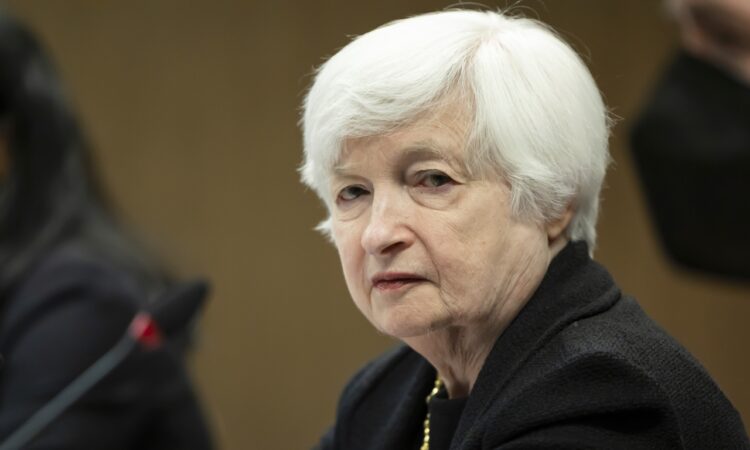
Trade tensions between the United States and the European Union are not dissipating. The most recent spat is publicly unfolding over President Biden’s signature climate legislation, the Inflation Reduction Act (IRA). Nowhere was the lack of rapprochement clearer than during French President Emmanuel Macron’s state visit to Washington last November, where he was reported to have told Sen. Joe Manchin (D-W.Va.), a critical architect of the bill, “You’re hurting my country.”
The reason for such an accusation stems from a provision in the IRA that will give consumer tax credits for purchases of electric vehicles (EVs) that meet certain criteria, including sourcing the critical minerals that go into EV batteries from countries with which the United States has a trade agreement. The problem? Manchin seems to have discovered only recently that the United States does not have a trade agreement with the European Union (EU). The Treasury Department, which is developing guidance on implementation of the IRA, may have a solution. However, its attempts to address the most recent transatlantic trade friction could create a bigger problem.
That’s because back in December, Treasury released a white paper that noted the absence of a definition of “free trade agreement” in the IRA and U.S. law more broadly. In a recent interview, Treasury Secretary Janet Yellen suggested that the EU and other allies may need to negotiate trade deals with the United States, but that these agreements could focus on issues like trade in critical minerals “that could qualify in the future as a free-trade area.” Such a move would be a significant shift away from longstanding U.S. practice and threaten to dismantle a guiding principle of U.S. trade policy.
It is generally accepted that a free trade area covers “substantially all trade” between two or more parties, reducing a broad range of trade barriers between them. This language is embedded in Article XXIV of the General Agreement on Tariffs and Trade. The United States is no stranger to this definition. Archival research shows that the United States specifically sought to include this language as an exception to the principle of non-discrimination, which ensures that the treatment a country affords to one market is granted equally to others. An exception was needed because the Europeans were creating a customs union and the United States wanted to have the flexibility to conclude a free trade agreement with Canada.
In the late 1960s, the U.S. objected to a proposed trade pact between Spain and the European Community, “based on our established policy seeking to develop a multilateral system of trade and payments based on non-discrimination.” U.S. officials contended that the United States “could condone a more ambitious scheme, which would amount to a ‘free trade area’ between the EC and Spain,” which “would mean freeing the bulk of industrial and agricultural trade between EC and Spain, rather than partial tariff cutting on industrial products only as presently contemplated.”
In the current U.S.-EU impasse, this means that sectoral agreements — such as that proposed by Yellen on critical minerals — do not count as a free trade area. While U.S. Trade Representative Katherine Tai might label similar efforts as “a new type of trade agreement,” Georgetown University law professor Kathleen Claussen terms these trade executive agreements, or “mini-deals.” They are anything but new. In her research, Claussen documents 1,200 such agreements involving 130 countries, many of which “slip under the radar” of traditional trade monitoring and accountability. The 2019 U.S.-Japan Digital Trade Agreement is one example, and in the 1980s, the United States stirred controversy over accords with Japan to establish export price floors on Japanese semiconductors. These raised the alarm because Article I, Section 8 of the Constitution gives “exclusive and plenary” authority to Congress over regulating commerce with foreign nations. Mini-deals subvert that check on presidential power.
Meanwhile, Manchin has called on the Treasury to “pause implementation” of the tax credits until guidance that reflects the letter of the law is put forward. The language of the IRA is sufficiently precise that efforts to expand coverage of the tax credit must include liberalization. It is for that reason that Congress should care about this suggested change to a longstanding U.S. position on acceptable exceptions to the principle of non-discrimination. While Yellen may be right that there is no statutory definition of a “free-trade area,” we don’t need one — it’s a generally accepted definition reflected in our international agreements. Walking away from it now would only serve to cut Congress out of the trade policymaking process and undermine the rules-based international system that the United States helped to create.
There is no easy way to solve the transatlantic trade spat created by the IRA’s language. The United States and the European Union must do the hard work of restarting actual trade negotiations. Anything less just won’t cut it.
Inu Manak is a fellow for trade policy at the Council on Foreign Relations in Washington. Follow her on Twitter @inumanak.






